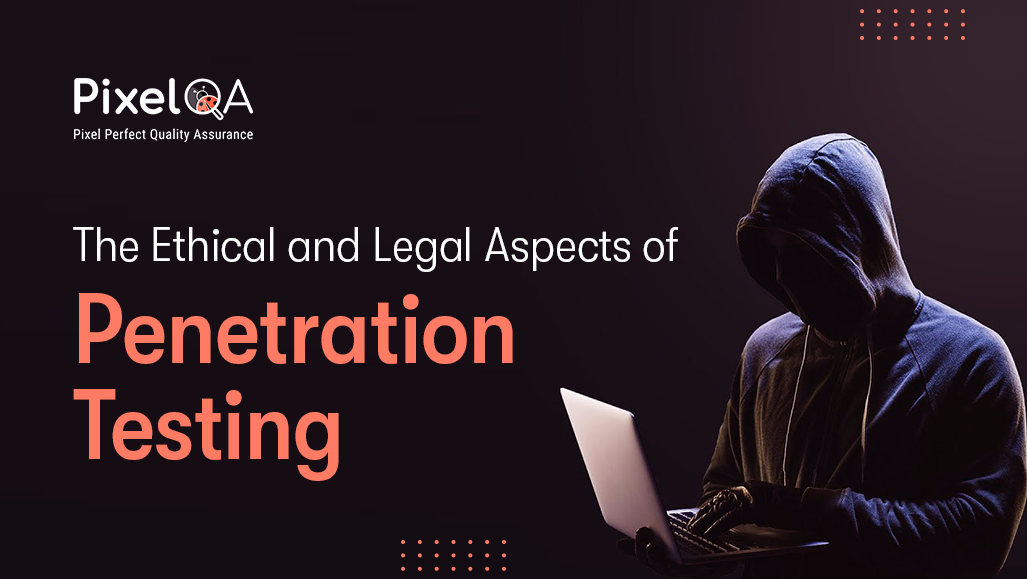
Penetration testing is vital in cybersecurity. By simulating cyberattacks, ethical hackers can identify a system's weaknesses prior to the offenders. Though its basic goal is to fortify security, penetration testing is a multifaceted blend of ethical and legal issues that must be dealt with by professionals with the highest level of accuracy. Though vital as the technicality of the test is the mandate of maintaining ethical conduct and legal practice. This part will address the most crucial ethical and legal concerns to which penetration testers are committed. Want to be a penetration tester or merely wish to know about doing ethical hacking? You should know the fundamentals in order to keep your ethical and legal plans intact.
Table of Contents
- Let's Understand Penetration Testing
- A penetration tester, or "ethical hacker,"
- Legal Considerations in Penetration Testing
- Ethical Aspects of Penetration Testing
- Best Practices for Legal and Ethical Penetration Testing
- Conclusion
Let's Understand Penetration Testing
Let us first define penetration testing, or rather ethical hacking. Before going into the legal and ethical part, Penetration Testing Services are the practice of the simulation of cyber-attacks on network systems, or Web applications with the aim of finding vulnerabilities that can be exploited by hackers and turned against them. Web applications with the aim of finding vulnerabilities that can be exploited by hackers and turned against them. applications for the mere purpose of finding the vulnerabilities that can be exploited by hackers and turned against them. to determine the vulnerabilities that can be used by hackers against them.
A penetration tester or "ethical hacker"
uses the same techniques as attacking a malicious person but with permission and for the good of the company to enhance its position of security against all kinds of assaults from hackers, whether network or social engineering means.
We can now proceed to the legal and ethical terms of the penetration testing process.
1. Legal Considerations in Penetration Testing
There are complex legal issues that may be encountered in the course of penetration testing. Penetration testing is prone to crossing the line of lawful activity if it is not approved or fails to adhere to relevant legislation. The factors mentioned below are crucial factors that must be considered by penetration testers:
1.1 Written Permission
Written permission from the company whose systems are being tested is the most critical legal requirement for penetration testers. "Rules of Engagement" is what this paper refers to. You risk engaging in illegal hacking without doing so, which is illegal in most countries.
The CFAA was intended to protect data and computer systems from abuse and unlawful access. Thus, even for purposes of security, any unauthorized attempt to probe or brake systems could be declared a crime under this law and punished with severe penalties.
To ensure that the penetration tester is legally permitted to test the systems, the written agreement also plays a significant role. The tester can be breaking laws relating to illegal access, e.g., the Computer Fraud and Abuse Act (CFAA), if this written authorization is not provided.
1.2 Scope of Testing
What is and what is not allowed during the testing process is outlined in this paper. As an example, penetration testers might be allowed to attempt to exploit network vulnerabilities but may not test any employee devices or gain access to confidential data, like client data.
Extending the agreed-upon scope may result in severe consequences from the law, such as:
Data breach: If any kind of data breaches, then both the organization and the penetration tester may face legal penalties for gaining unauthorized access to sensitive or confidential information.
Invasion of privacy: Privacy laws like the CCPA in California or the GDPR in Europe can be violated by disclosing personal data or accessing private accounts.
Therefore, an important aspect of legal compliance is ensuring that the scope is defined correctly and maintained to.
1.3 Compliance with Data Protection Laws
The data protection laws and regulations that govern the processing of sensitive information should be known to penetration testers. For instance:
General Data Protection Regulation (GDPR): According to the GDPR, a penetration tester can be made liable if he/she deals with personal information while testing it improperly. It consists of activities such as passing or storing sensitive details in the wrong way. It could have profound legal repercussions both for the company and the tester.
Health Insurance Portability and Accountability Act: HIPAA is one of the laws that ensures patient privacy. When you are evaluating the security of a health system, you must process patient information according to HIPAA rules.
If you are not meeting these rules, it may lead to heavy fines for the company under test, and the tester may also be held legally liable.
1.4 Third-Party Authorization
Penetration testing of third-party hosted systems, e.g., cloud-based service providers or third-party external services, can be expected to be a requirement of penetration testers at some point. Under these circumstances, both the customer and third-party provider must provide written authorization. When they are contracting with third-party providers, penetration testers must attempt not to violate any agreements or terms of service contracts.
Without proper authority, the tester could be subject to legal penalties for harming third-party systems or violating privacy commitments.
2. Ethical Aspects of Penetration Testing
Ethics are of prime importance in penetration testing. The intention of ethical hacking is to make companies secure and not exploit vulnerabilities for profit or ill motives. Some of the most important ethical issues are:
2.1 Conduct in Good Faith
Penetration testers need to always act in good faith and for the greatest benefit of the organization. That involves putting concentration on exposing the vulnerabilities which are open to being attacked by criminal individuals and suggestions for remedies of rectification of these weaknesses rather than taking recourse to using such information to generate profit personally.
For instance, ethical hackers ought never to
Steal information: Testers should never exfiltrate confidential information, even if they find it in the process of testing. The objective is to discover vulnerabilities, not exploit or abuse information.
Use vulnerabilities for personal gain: A penetration tester should never leverage the vulnerabilities that they find to compromise the assets of the organization or access systems outside of their authorized test boundaries.
2.2 Transparency
Transparency should be provided by penetration testers in their conduct throughout the test process. There is a need to keep the client updated about the testing methodologies, tools, and progress. Transparency in the fullest sense possible will ensure both the tester and the organization see the project, minimizing misunderstandings.
In addition, when a weakness is identified, ethical hackers ought to report it forthwith and give the organization recommendations on how to resolve it.
2.3 Confidentiality and Data Handling
Confidential or sensitive information is frequently met with by penetration testers. Confidentiality has to be maintained. Any sensitive information which ethical hackers might discover while testing should never be shared or traded.
Also, penetration testers ought to:
Ensure that data is handled appropriately and safely deleted upon testing.
Prevent the sharing of findings with unauthorized individuals.
Encrypt the transfer of sensitive data.
2.4 The Harm Principle
The main aim of penetration testing must always be to minimize loss. Testers must avoid adopting methods that can disrupt business functions or put employees, clients, or the business's reputation at risk. As a case in point, except where absolutely necessary and within test parameters, testers must not send hits that could lead to system crashes, downtime, or damage to data.
2.5 Responsible Disclosure of Vulnerabilities
Penetration testers must report vulnerabilities accurately if discovered. That means giving notice to the security team of the company first, so they can deal with the issue before it is publicly disclosed.
A good, responsible disclosure policy serves to safeguard users and the organization from attackers who may use a vulnerability before it is dealt with.
3. Best Practices for Legal and Ethical Penetration Testing
To ensure that penetration testing is both legal and ethical, the following are some best practices that should be followed by testers and organizations:
Always Get Written Permission: Make sure you have clear, written consent from the organization to test their systems, and ensure that the scope is well defined.
Be Open: Inform the client regularly during the penetration testing process. Explain what tools and techniques you're employing and keep them posted with progress reports.
Be Compliant with the Law: Get familiar with the laws and regulations under which data protection, cybersecurity, and penetration testing are conducted in your location or sector.
Work Within the Scope: Adhere to the tested scope as agreed upon. Don't overstep it without further approval from the client.
Maintain Confidentiality: Keep all findings and data confidential. Do not disclose sensitive information to unauthorized individuals.
Disclose Vulnerabilities Responsibly: Always inform the client of found vulnerabilities and give them time to patch the vulnerabilities before disclosing any findings.
Practice Integrity: Always conduct yourself in good faith and never abuse the information or access you receive during a penetration test.
Conclusion
The most important phase for data protection is penetration testing; therefore, on the flip side, it's the customer's job not to fail but to get all things in position, from possessing necessary permissions to achieving compliance and credentials with privacy legislation. Reliable Software Testing Company play a crucial role in ensuring thorough and secure penetration testing. Apart from the laws, the penetration testers must be honest and transparent in their work, and should exercise caution, particularly when dealing with sensitive data.
About Author

Rushi Mistry is a Security Tester at PixelQA with a focus on cybersecurity. He is passionate about IoT penetration testing and is working towards obtaining a CISSP certification, with the ultimate goal of becoming a Chief Information Security Officer (CISO).

_638784119305294752.png)